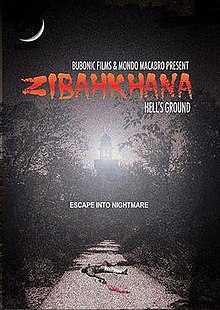Zibahkhana
| Zibahkhana: Hell's Ground | |
|---|---|

Film poster
|
|
| Directed by | Omar Ali Khan |
| Produced by | Pete Tombs |
| Written by | Omar Ali Khan |
| Starring | Ashfaq Bhatti Sultan Billa Osman Khalid Butt Rubya Chaudhry Rooshanie Ejaz Najma Malik Saleem Mairaj Haider Raza Rehan Kunwar Ali Roshan |
| Music by | Stephen Thrower |
| Cinematography | Najaf Bilgrami |
| Edited by | Andrew Starke |
| Distributed by | Mondo Macabro |
|
Release date
|
|
|
Running time
|
80 minutes |
| Country | Pakistan |
| Language | Urdu English |
Zibahkhana (English: Slaughterhouse (literal meaning), Hell's Ground (English title)) is a 2007 Urdu-English slasher film directed by Omar Khan. It premiered at the NatFilm Festival in Denmark and has been screened at festivals all over the world including Toronto, New York City, London, Neuchatel, Stockholm, Cape Town, Austin, Philadelphia, Cambridge, Puerto Rico, Sitges, Valencia, Oslo, and Helsinki. The film passed censors in Pakistan (with 9 seconds cut) and became the first non 35mm, HDV feature film released in Pakistan cinema history. It also holds the distinction of being shot in 30 days.
Ayesha is introduced as the Final girl played by Rooshanie Ejaz. She is the modest one of the group, she has the most trouble getting permission to go on the road trip from her mother and does not smoke Marijuana like her friends. She is very religious and wears a necklace with "Allah hu Akbar" engraved on it.
Baley is the elder brother of the main killer and holds a similar profile to the Hitchhiker and Chop Top from The Texas Chainsaw Massacre. Baley's mother refers to him as a healer, he is introduced in a small tent reciting something, surrounded by candles, he gets into Vicky's van uninvited and gives them directions. He demands water and the teenagers tell him they don't have any, he retaliates by showing them a severed head of a previous victim and is immediately kicked out of the van. The role is played by Saleem Mairaj.
Played by Najma Malik, Bari Bua is the mother and dominant member of the killer's family. She is initially shown as a sweet, hospitable woman living in a tent. She is widowed and she keeps the remains of her husband in a closet with his photograph attached to his skull. She dislikes urban development as the new highways are cutting the rest of Pakistan from her humble village, but she does mention she is grateful to Allah as many customers come from the cities to purchase her "goats".
...
Wikipedia
